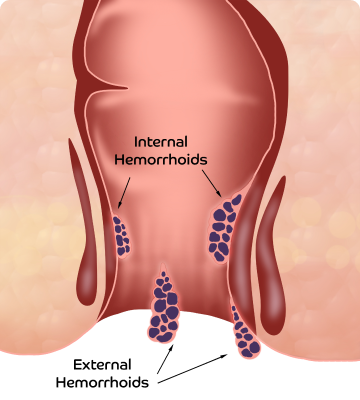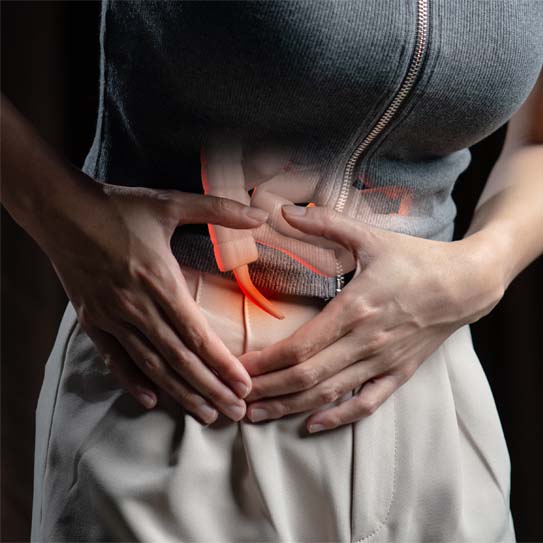What happens when appendicitis is not treated on time?
An appendix may not cause not always cause severe complications. But in some cases, the appendix may burst and cause life-threatening complications.When the appendix bursts, the peritoneum or the appendix lining may get infected with bacteria. This condition is known as peritonitis where the bacteria lining may spread and infect other parts of your abdomen too. Now the question is, how will you identify the condition of peritonitis? Common symptoms of peritonitis include:
- Sudden excruciating pain in the abdomen
- An increase in the heartbeat
- A rise in body temperature
- Trouble breathing
- Abdominal swelling
To prevent these potential complications, it is crucial to consult an appendicitis specialist at the earliest.
What is the difference between acute and chronic appendicitis?
Most people confuse chronic and acute appendicitis with each other. Appendicitis occurs when the appendix becomes infected or inflamed and starts causing abdominal pain. But in acute and chronic cases, the frequency and severity of the pain are quite different.
Acute Appendicitis –
Appendicitis is said to be acute when a person develops severe symptoms suddenly within 24-48 hours. It is a medical emergency that should be treated without further ado. It occurs due to the following reasons-
- A viral, bacterial, or parasitic infection in the digestive tract
- Stools causing a blockage in the tube between the large intestine and appendix
- Inflammatory bowel disease
- Injury or trauma in the abdomen
- Tumors
Without treatment, the appendix can rupture or burst out within 2-3 days if the symptoms persist. Moreover, the abdominal pain will be intense and hard to ignore.
Chronic appendicitis –
It can occur due to many different reasons, such as:
- Inflammation and obstruction of the appendix
- Accumulation of fecal matter
- Calcified fecal deposits or appendix stones
- Trauma to the abdomen
- Enlarged lymph nodes and glands
- Build up of foreign objects
- Tumor
In chronic cases, the pain (this is the primary symptom) of appendicitis lasts for longer periods, most often a week or so. There can be other symptoms like fever, swelling, tenderness in the abdomen, tiredness, nausea, diarrhea, etc. present alongside. However, not all people with chronic appendicitis will have these symptoms.
The symptoms also subside on their own and return abruptly, which further makes it harder for the doctor to diagnose the condition accurately. Out of all the cases of appendicitis, only 1.5% are chronic.
How is laparoscopic appendectomy better than open appendectomy?
Open appendectomy is the traditional approach that is performed through an incision of about 5cm or 2 inches on the right side of the lower abdominal wall. Laparoscopic appendectomy is a modern procedure that is performed through multiple small-sized incisions, each of about 1 cm or 1/2 inch.
While open appendix surgery is highly invasive, laparoscopic appendix surgery is minimally invasive and has the following advantages over the traditional approach.
- Tiny scars with less tissue cutting
- Reduced post-surgical pain
- Reduced risk of wound infection
- Shorter hospital stay
- Quicker return to normal activities
- Higher success rate
- Minimal restrictions on diet
- Faster recovery
Open and laparoscopic appendectomy has several risks and complications. But it is up to the surgeon to choose the best technique for the patient. In most cases, a patient prefers to undergo laparoscopic appendix removal surgery. However, in some cases, especially when the appendix is infected, the doctor may have to use the open surgical technique to carry out the procedure safely.
Post-Surgery Care After Appendectomy
Whether you’ve had open appendicitis surgery or laparoscopic surgery, you will have to follow the doctor’s instructions to take care of the wound and overall health. You will have to follow the tips below:
- Take a bland diet in the next few days after having an appendectomy.
- Advance gradually and start eating usual food only if your body allows it.
- You may experience constipation for a few days after surgery due to heavy pain medications.
- Most patients don’t have bowel movements up to 3 days after surgery.
- Therefore, the doctor may prescribe stool softeners or laxatives to help prevent constipation.
- Pain is natural after a surgical procedure. Therefore, the doctor will prescribe some pain medications as well as anti-inflammatory and antibiotic medicines.
- Usually, dissolvable sutures are used to close the wound. However, in some cases, stitches may be used. In both scenarios, keep the wound clean and dry. Make sure that you don’t soak in hot tubs or swim as it can cause irritation or infection in the wound.
- You can take a bath the day after the surgery, but don’t let the incisions get wet.
- Avoid driving until the doctor gives you permission.
- Limit your physical activities and make sure that you don’t lift heavy weights for at least two weeks after surgery.
- Wear loose and comfortable clothes that give you freedom of movement and don’t rub against the wound.
- Visit the doctor for post-surgery follow-ups whenever required or as suggested by the doctor.
How to prevent appendicitis?
Generally, there is no assured way to prevent appendicitis from occurring except for diet control. By choosing the right food and a balanced diet, you will be able to keep your digestive tract healthy and prevent the appendix from becoming inflamed.
Foods you should eat:
All foods that are rich in fiber help to prevent appendicitis. These foods include:
- Oats or wheat gram for breakfast
- Whole wheat flour
- Brown rice
- Fresh fruits
Foods you should avoid:
Here are the food items that can increase your risk of appendicitis:
- Fried foods that are fatty and irritate the digestive system.
- Alcohol as it harms the liver and affects digestion.
- Processed foods, such as meat or frozen food items.
- Baked goods, including cakes, pastries, cookies, etc.
- Excess of sugar









.svg)









